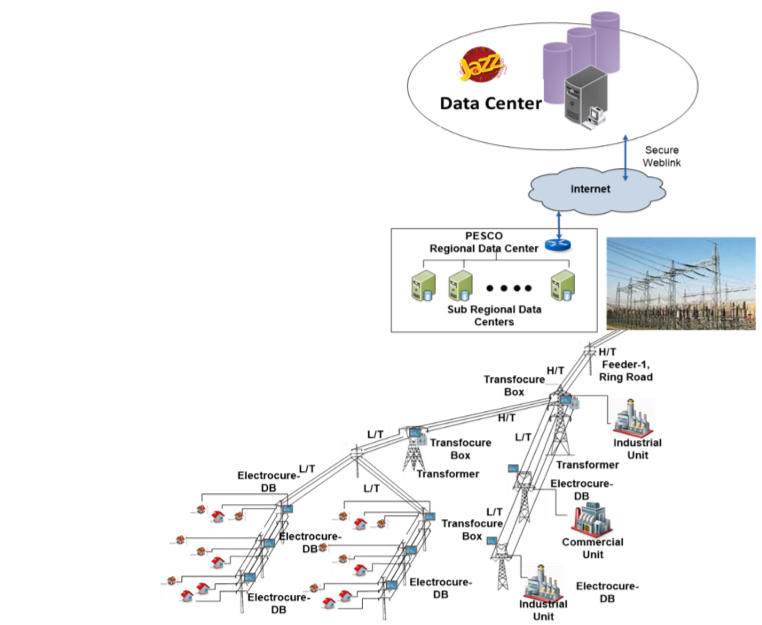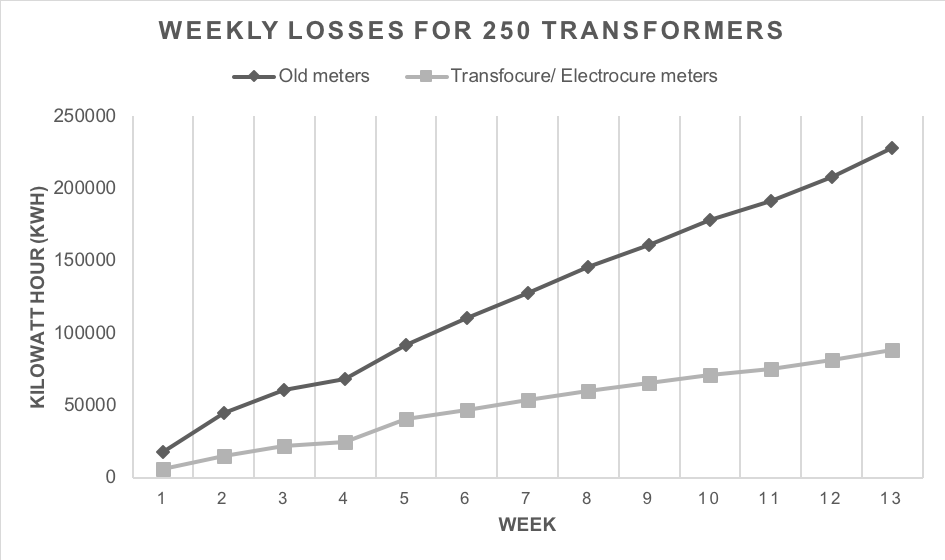Jazz (VEON Group) is one of Pakistan’s leading mobile network operators with a 36.4 percent market share. Over the past few years, Jazz has invested in building intelligent systems to digitise electricity infrastructure and distribution in Pakistan. In May 2018, Jazz received a grant from the GSMA M4D Utilities Innovation Fund to develop and implement a mobile-enabled theft prevention and loss reduction solution for an urban electricity grid distributor. Jazz, along with its technology partner, Company of Intelligent Systems and Networks Research (CISNR) and grid distributor Peshawar Electric Supply Company (PESCO),is implementing this solution to address Pakistan’s growing line losses and electricity theft. Jazz, as the lead implementation partner, supports this solution by providing machine-to-machine (M2M) connectivity and cloud hosting for all data generated by the solution. CISNR, a tech start-up based out of UET Peshawar, has developed a unique grid distribution monitoring system along with smart metering. PESCO is a power distribution company serving over 2.6 million consumers in Khyber Pakhtunkhwa, Pakistan.
Through the grant project, CISNR installed their ElectroCure and TransfoCure modules on two of PESCO’s feeder lines to improve electricity reliability for the 262,500 consumers connected to these. Consumers experienced 50 per cent less load-shedding as a result of the project. After just three months of implementation, PESCO’s line losses on each of the 254 transformers, dropped from 1088KW to 560KW leading to savings worth $78,980 in one quarter.
Watch our case study video for a quick overview of the grant project.
Pakistan’s top two electricity distribution issues are – electricity theft and line losses
Electricity generated in power stations passes through large, complex networks like transformers, overhead lines, cables and equipment before reaching the end users. In most cases, the number of units of electric energy generated by Power Station does not match with the units distributed to the consumers resulting in a line loss. There are two types of line losses:
1. Technical Losses – energy lost in the equipment used for electricity transmission; often a result of long transmission lines and outdated/ inefficient equipment and imbalanced load that produce voltage drops.
2. Non-technical losses/commercial losses – loss outside the power generating system; consists of electricity theft, meter tampering and unpaid bills.
Pakistan’s power sector suffers from inefficiencies that cost the economy $18 billion or 6.5 percent of GDP in fiscal year 2015. Almost one-fifth of electricity generated is lost through poor infrastructure, faulty metering and theft. In 2018-19, the overall line losses of distribution companies in the public sector were 18.3 per cent. PESCO’s line losses dropped by almost two per cent in a year, but it continues to be the second most inefficient company with line losses of 36.2 per cent in 2018-19. Besides network losses, PESCO is massively understaffed, making it impossible to monitor every neighborhood and visit every household-level electric meter regularly. This is made worse by the geography PESCO operates in- mountainous, sparsely-populated terrain – making access to consumers, bill monitoring and maintenance ever harder.
“We have only two meter-readers for 13,000 meters in one subdivision and one man can cover up to six meters a day. How are we supposed to read every meter every month?”
PESCO official
Electricity distribution challenges have a serious impact on end users as well, who end-up having to pay more because someone maybe illegally tapping into their line and also have to purchase generators for when there is load shedding. This creates a vicious cycle of load-shedding and financial losses as customers become unwilling to pay for poor services, particularly as those steeling get it for free. This leaves the remaining customers with high electricity bills to cover the losses. By bringing real- time visibility of grid distribution infrastructure and electricity consumption patterns, electricity companies like PESCO can reduce the risk of line-loss and theft. This in turn leads to improved uptime, accurate billing and a better customer experience.
The solution
CISNR has developed two unique solutions – ElectroCure and TransfoCure, which when deployed across the electricity distribution network, provide real-time monitoring and control of the power distribution infrastructure and consumption data. ElectroCure and TransfoCure can be easily integrated with the existing electricity infrastructure, making the joint solution both innovative, and cost-effective for grid distributors facing huge line-loss through electricity theft.

TransfoCure is a hardware unit installed on transformers, which monitors the flow of electricity and identifies load patterns. TransfoCure provides PESCO various run time parameters such as, voltages, currents, power factor, link down, short circuit, unbalancing and phase shifts. It protects the transformer from damage due to overloading and unbalanced load. It also has an auto-complaint feature to report system errors.
ElectroCure is a low-cost smart meter where a single module serves multiple consumers. ElectroCure modules are installed at electricity distribution points and provide real time data on electricity distributed to consumers and remote monitoring & control.
Grant impact
Before the grant project was launched, PESCO recorded annual technical line losses of 32.6 per cent and non-technical/commercial losses of 11.7 per cent in their electricity distribution infrastructure. PESCO chose to implement CISNR’s TransfoCure and ElectroCure modules on two feeders in Peshawar – Karkhano Market feeder and Ring Road feeder. PESCO provides electricity to 262,500 customers through the Karkhano and Ring Road feeders. Both feeders serve a mix of domestic and commercial customers and report high line losses and power theft, as reflected below.
| Feeder Location | Number of Transformers | Monthly Losses |
| Karkhano | 59 | 38.3%[IC1] |
| Ring Road | 195 | 41.1% |
Reduction in line losses by 6.7 per cent after installing TransfoCure
CISNR installed TransfoCure modules across all 254 transformers on the Karkhano and Ring Road feeders. After three months of implementation, PESCO’s monthly line losses on these feeders reduced from 39.5 per cent on average to 32.8 per cent – a reduction of 6.7 percentage points. In the figure below, we can see a weekly trend in transformer line losses, comparing old meters (legacy equipment[1]) and TransfoCure equipped transformers.

Annual savings worth USD 19,745 only by installing ElectroCure on 10 transformers
Under the grant project, PESCO installed 10 ElectroCure units just on the Karkhano feeder. This improved the accuracy of bills and helped identify theft for 50,000 customers. On average, each ElectroCure device monitors consumption for 50 connections. After implementation, losses on the whole feeder reduced from 38.3 per cent to 27.2 per cent.
If managed effectively, PESCO can save PKR 3.35 million or $19,745 every year due to the implementation of electrocure on just these 10 transformers. Given this projection, it would lead to massive annual savings when implemented across PESCO’s distribution network.
50 per cent reduction in load-shedding and improved accuracy of billing for end-users
Reduced losses for PESCO through the project, meant that customers now had access to reliable electricity and more accurate billing. This meant a reduction in load shedding (electricity downtime) by 50 per cent from 10 hours per day to 5 hours per day on the network.
Implementing a solution that focuses on eliminating theft can be challenging and face resistance from those using electricity illegally. During the project period, 15 per cent of the TransfoCure and ElectroCure devices were physically damaged or stolen to disrupt the metering process. More TransfoCure devices were targeted as they are more exposed to the outside world.
What’s next for Jazz and CISNR?
For most electricity distribution companies like PESCO, it is practically impossible to ensure timely collection of accurate data using manual meters and limited human resources. Legacy systems are subject to human errors and possible corruption which could lead to incorrect billing. However, installing smart meters at individual households in densely populated cities is also not viable and would lead to high network costs. The ElectroCure and TransfoCure solutions have a clear advantage over regular smart metering as a single module/device can cover multiple households at a reduction of times lesser cost. Access to real-time data, through efficient technology deployment, helps electricity providers better plan on electricity management, reduce maintenance costs and reduce load-shedding.
When Jazz initiated the partnership with PESCO, things weren’t exactly easy. Partnering with a public utility presents challenges around bureaucratic administrative processes and systems, as well as sharing data effectively and safely. We’ve seen similar challenges with other mobile operators who’ve partnered with electricity distribution companies (Dialog – LECO, Sri Lanka). We’ve learnt that being patient, persistent and quantifying the commercial benefits of the solution is key to securing and overcoming initial growing pains associated with a partnership.After successfully implementing the grant project, PESCO recognises the revenue saved from Electrocure and Transfocure and now plans to extend the solution to other districts in Khyber Pakhtunkhwa. Jazz and CISNR are currently working on scaling this up to a subscription based model that can be applied to all utility companies in Pakistan. Jazz is also looking to integrate ‘JazzCash’, their mobile wallet, into PESCO’s billing system to facilitate digital bill payments. The solution developed and successfully implemented by Jazz, CISNR and PESCO makes a strong case for other public utilities to go digital and minimise line losses and electricity theft in developing economies like Pakistan.
The GSMA Mobile for Development (M4D) Utilities programme is funded by the UK Department for International Development (DFID), USAID as part of its commitment to Scaling Off-Grid Energy Grand Challenge for Development and supported by the GSMA and its members.



